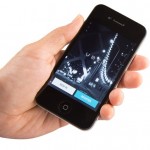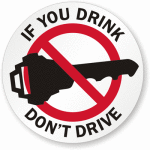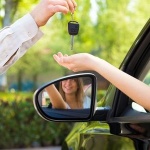Is Uber cutting down on drunk driving?
 In February of this year, Uber officially became available to the Scranton/Wilkes Barre area.
In February of this year, Uber officially became available to the Scranton/Wilkes Barre area.
What is Uber? Born in San Francisco and common in large cities before making its NEPA debut, Uber is a mobile app/service that allows users to connect with professional independent contract drivers hired by the company to provide a ridesharing service, similar to a taxi service. Uber is currently available in 50 countries and 250 cities.
Uber has been in the news a lot lately, particularly for questions regarding its safety. This blog and infographic from the Michigan Auto Law Blog entitle “How Safe is Uber?” does an excellent job of breaking down the safety concerns and what Uber is doing to make its service safer for both riders and drivers.
One reason we’re interested in Uber is because of its potential to reduce the number of drunk driving accidents that happen each year. December-March is said to be the “drinking season” – many of the year’s heaviest drinking days occur in this time span – Christmas, New Years, Super Bowl Sunday, and St. Patrick’s Day – all of these days see a spike in drunk driving tragedies.
 Technology seems to be the latest weapon of choice in the war against drunk driving accidents. Many newer model vehicles are outfitted with ignition interlock devices designed to prevent a driver who is intoxicated from operating the vehicle. These devices are already widely used as part of sentencing or as a condition for drivers convicted of a DUI to have their license reinstated. But, this only works on drivers who have been convicted, and, shockingly, most drunk drivers make an estimated 80 trips while intoxicated before they get caught. A new technology called a driver alcohol detection system for safety, or DADSS, if installed in all new models would prevent vehicles from moving if excessive alcohol levels were detected in the driver.
Technology seems to be the latest weapon of choice in the war against drunk driving accidents. Many newer model vehicles are outfitted with ignition interlock devices designed to prevent a driver who is intoxicated from operating the vehicle. These devices are already widely used as part of sentencing or as a condition for drivers convicted of a DUI to have their license reinstated. But, this only works on drivers who have been convicted, and, shockingly, most drunk drivers make an estimated 80 trips while intoxicated before they get caught. A new technology called a driver alcohol detection system for safety, or DADSS, if installed in all new models would prevent vehicles from moving if excessive alcohol levels were detected in the driver.
The mobile app BACtrack is another tool to combat the deadly trend. BACtrack is an app that allows users to perform blood alcohol concentration tests before driving, with the hope that this would deter people from driving while intoxicated.
And now, some say that services like Uber and Lyft have the potential to reduce the number of DUIs issued and the number of drunk driving tragedies that take place each year. This is especially true in a city like Scranton, where taxi services exist but are not as readily available as they are in larger, more metropolitan locations.
But will it really work? The research is fascinating. The Washington Post cites studies indicating that Uber and Lyft have already lead to fewer DUI arrests and fewer drunk driving accidents.
 Mothers Against Drunk Driving (MADD) cites surveys and reports that show that young people (the most risky demographic) are overwhelmingly likely to recommend Uber or a similar service to a friend as an alternative to driving while intoxicated. Another study showed a 6% drop in DUI’s in the areas where Uber was actively operating. Now, other factors may be at play in contributing to these numbers, and it may be too soon to tell what kind of impact Uber is having thus far, so take the information with a grain of salt. However, that doesn’t change the fact that these services have the potential to decrease the number of tragedies that occur if people choose to use them. It is one more option that people have to keep themselves and their friends from getting into a catastrophic accident.
Mothers Against Drunk Driving (MADD) cites surveys and reports that show that young people (the most risky demographic) are overwhelmingly likely to recommend Uber or a similar service to a friend as an alternative to driving while intoxicated. Another study showed a 6% drop in DUI’s in the areas where Uber was actively operating. Now, other factors may be at play in contributing to these numbers, and it may be too soon to tell what kind of impact Uber is having thus far, so take the information with a grain of salt. However, that doesn’t change the fact that these services have the potential to decrease the number of tragedies that occur if people choose to use them. It is one more option that people have to keep themselves and their friends from getting into a catastrophic accident.
In other words, today, people have fewer and fewer excuses for driving while drunk.
It is now easier than ever to find an alternative to driving drunk, and more difficult to justify such a bad decision. We hope that people everywhere will take advantage of these new technologies. If you or a loved one have been hurt by a drunk driver, contact the car accident attorneys at Munley Law Personal Injury Attorneys as soon as possible. We will help guide you through this difficult experience and make sure that your rights are protected. Our consultations are absolutely free. We can be reached at 855-866-5529.

Marion Munley
Marion Munley is recognized for her compassionate representation of catastrophically injured clients and her steadfast dedication to them and their families. Her advocacy has produced numerous multimillion-dollar recoveries, including one of the largest trucking accident settlements on record. Marion is Triple Board Certified by the National Board of Trial Advocacy in Civil Trial, Civil Practice, and Truck Law, and since 2023 has been named one of Pennsylvania’s Top 10 Super Lawyers by Super Lawyers.
Posted in Car Accidents.
Tagged Drunk Driving DUI









